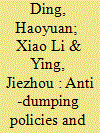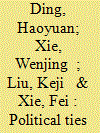| Srl | Item |
| 1 |
ID:
191150


|
|
|
|
|
| Summary/Abstract |
Anti-dumping policies, as one of the most important nontariff measures to protect a country's economic interests, can have an impact not only on a country's trade and social welfare, but also on capital flows. Anti-dumping measures can result in increased trade costs and alterations to exchange rate risk. This study investigates the impact of anti-dumping sanctions on the international portfolio allocations of global funds. Antidumping policies can decrease the proportion of a fund's investment portfolio allocated to recently-sanctioned countries. Closer trade ties between the sanctioned country and the country where a fund is domiciled exacerbate the divestiture, but stronger foreign direct investment links weaken the negative association. Some country and fund heterogeneities are also discussed. We find that more developed countries are less affected by the impact of anti-dumping measures on equity fund allocations; liberalization of the economy and stable government could also mitigate the negative impact of anti-dumping sanctions. High-risk funds, such as growth funds or funds that invest in leveraged buyouts, showed the greatest response to changes in anti-dumping regulations.
|
|
|
|
|
|
|
|
|
|
|
|
|
|
|
|
| 2 |
ID:
187815


|
|
|
|
|
| Summary/Abstract |
We study how a public health crisis affects the corporate sector at different phases of outbreak. Using an event study approach, we find significant valuation effects in a sample of Chinese listed firms following two symbolic events in the outbreak of COVID-19: (1) the lockdown of Hubei province; and (2) the containment of the disease in China and its spread to overseas. Market responded negatively (positively) to the first (second) event. Regression analysis further reveals that, following the first event, firms with Hubei (foreign) exposures earned significantly lower (higher) returns. Foreign exposures, however, had significantly negative effects on returns following the second event. The valuation effects of Hubei and foreign exposures also vary across firm ownership and industries. Our results indicate that, in a globalized world, firms' international status, internal networks and input-output linkages all play important roles in determining their exposures to the pandemic.
|
|
|
|
|
|
|
|
|
|
|
|
|
|
|
|
| 3 |
ID:
161867


|
|
|
|
|
| Summary/Abstract |
This paper estimates the effects of a nation-wide rural electrification program in China using an informative dataset for 2459 Chinese villages. The combined propensity score matching and difference-in-differences approach is adopted to address potential selection bias. Accordingly, the program can significantly increase the net agricultural income per capita of farmers in the targeted villages. Moreover, matching grants with private assets and obligation labor force both can increase the effectiveness of the program. The program also highlights the complementarity between infrastructure and institution, in which the introduction of grassroots democracy will increase the effectivity of the rural electrification program.
|
|
|
|
|
|
|
|
|
|
|
|
|
|
|
|
| 4 |
ID:
156424


|
|
|
|
|
| Summary/Abstract |
Whether political ties enhance or weaken firm performance has been widely investigated in a number of studies, including some on China. Based on a database of non-financial A-share listed firms from 2004 to 2012, we study the effects of political ties on firm performance within a quantile regression framework. We find that there is a positive relationship between political ties and economic performance, but that it is diminishing with respect to firm performance. Political ties appear particularly important for weaker firms.
|
|
|
|
|
|
|
|
|
|
|
|
|
|
|
|
| 5 |
ID:
171896


|
|
|
|
|
| Summary/Abstract |
In this paper we assess the causal relationship between international crude oil price changes and the RMB exchange rate using daily information from 21 July 2005 to 5 April 2017. In addition to linear causality tests, we employ quantile causality test to identify prior imperceptible causality in quantiles. We find a causal relationship from crude oil price to exchange rate at each quantile interval, but the reverse only appears in tail. This may help to explain why a traditional linear test fails to capture the causality from exchange rate to crude oil price as the quantile causalities in tails are canceled out by each other. Moreover, using RMB as the settlement currency in crude oil trade can weaken the prior significant causal relationships between crude oil price and exchange rate, whereas the reform of exchange rate marketization reignites the tail causalities from exchange rate to crude oil price. These findings recommend a wider use of domestic currencies in crude oil trade to avoid risk from the crude oil market.
|
|
|
|
|
|
|
|
|
|
|
|
|
|
|
|